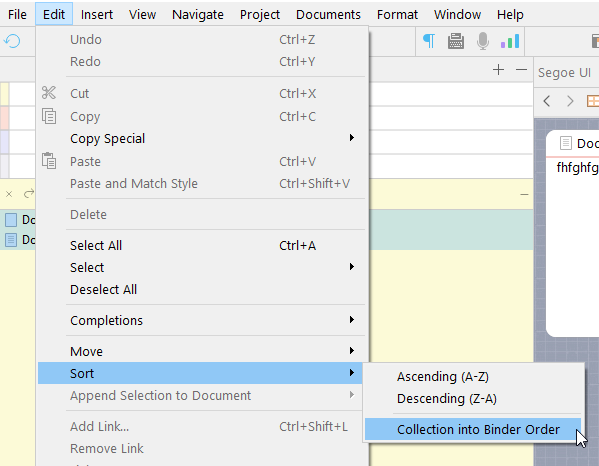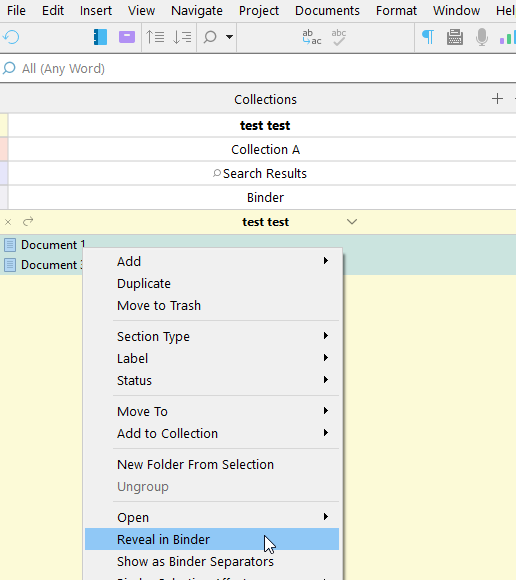Ok, I’ll try. If I find a better alternative I will let you know 
You’ll need this :

Well, I thought it could be done, but it seems that the only way to search a collection is through ctrl+F.
So forget about my suggestion to add the search result to a collection, there isn’t much to gain from it.
(I was pretty sure it could be done, but it seems like I was wrong.)
Just do as Gr said. Search one, fix. Search the other one, fix.
Select all the documents in the Collection, then check the “Search Binder Selection Only” line in the Search Options.
Doesn’t work (Windows)
I get 0 result, as (if) nothing is actually selected in the binder itself. → (I have opened another document from the binder since creating the collection. – Document which doesn’t contain the searched word, obviously.)
. . . . . . . . . . . . . . .
OK. One needs to first select all of the collection’s documents, then right click + “reveal in binder”.
Then “search binder selection only”, in the search options, like @kewms said.
(So, as it turns out in the end, the collection’s only purpose is to serve as a “memory” for the two combined searches.)
In other words, as it is now (bug ? maybe) we are not actually searching the collection. But rather the binder’s selection. (Which we now have set here to match the collection.)
That, so far, is the only way I could get it to work…
When I say do two searches, I mean do one search and then do another search.  As described, you were trying to do a search which would get you every instance of whole word ‘house’ as well as every instance of string (whole word or not) ‘garden’. You have, of course, not indicated why you would want or need to do such a thing, but an obvious solution is to do two searches: 1) search for every whole word instance of ‘house’ and do whatever you were going to do with that result (e.g. a word replacement), and then also 2) search for every string instance ‘garden’ and do what you wanted to do with those results. Both of these steps are easily doable and surely in no significant sense harder than if you had a (non-RegEx) way to do both simultaneously.
As described, you were trying to do a search which would get you every instance of whole word ‘house’ as well as every instance of string (whole word or not) ‘garden’. You have, of course, not indicated why you would want or need to do such a thing, but an obvious solution is to do two searches: 1) search for every whole word instance of ‘house’ and do whatever you were going to do with that result (e.g. a word replacement), and then also 2) search for every string instance ‘garden’ and do what you wanted to do with those results. Both of these steps are easily doable and surely in no significant sense harder than if you had a (non-RegEx) way to do both simultaneously.
I agree with Gr :
Search one, fix one.
Then on to the other.
Thank you gr and Vincent.
„You have, of course, not indicated why you would want or need to do such a thing,“
Well, I need Scivener to collect everything. I have over 15,000 documents in one database. So the more specific I search, the fewer results I get. And I don’t have to look through hundreds of documents when I’m looking for specific document.
It’s certainly my fault, but “Search Binder Selection Only” does not work 
Let’s assume I am looking for a document. I know that it contains the word “house”. So I choose the option „Whole Word“, search for „house“ and find 500 Documents that contains exactly „house“ (not household).
Now I just want to search for the word “garden”, “gardenparty“ etc” in these 500 documents. I select the 500 results, choose the option „All Words“ and search for „garden“.
But unfortunately this does not work. What am I doing wrong?
Look a few posts up.
I can look, but I do not know what you mean…
IMHO … not a good strategy for using Scrivener, but if you must, you must, I guess.
Yeah.
That is quite a lot of documents.
Well, Manual, page 72
“Scrivener has been tested against projects with millions of words in them; way beyond what it would normally have to face.”
“It can (…) store large quantities of research material, and handle many thousands of individual components”
The CPU can handle it just fine… but the user ?
lol …You might be right
If you’re needing a general purpose database, then you might want to take a look at other software that is designed to work in such a fashion (DevonThink for Macs, etc.) Scrivener is design around the concept of projects.
Having said that, though, learning a few simple basics of regular expressions could allow you to more easily search through what you’ve already collected. It’s no different in concept than learning how to use some of the other specific search tools, and there are a ton of good resources on the Internet to help give you gentle tutorials into using regular expressions. I am often amazed, after a lifetime in IT, at how much power I can evoke with simple, common regular expression syntax, not even scratching the surface of what is possible.
(What really sold me on learning regular expressions was the freelance project I did for a TTRPG system where I had over 300 character sheets to validate, correct, and then edit from the computerized output into standard house publication format for character blocks. I would have been lost without regexes.)
Hopefully there si a shorter way than this, but I did it this way:
- Set project search to settings for first search, enter the search term/phrase.
- Select all the resulting documents in the Binder, then x back to the Binder.
- Enable Scrivenings Mode if it is not on.
- Control-click the MultiSelection doc icon ini the Editor header bar to bring up the pop-up menu, and select Reveal in Binder. This has the effect of actively selecting all the disparate found docs in the Binder.
- Go to the settiings area of your project search settings and choose search only ni binider selectioin. Set other prams. Enter the search term/phrase.
- Your search results will be effecrtively a logiical AND of the two searches.
Are you sure you don’t just want to try a RegEx solution?
Thanks devinganger. You are right of course. For some of my needs DevonThink would be better. But DT is … ugly 
More important, Scrivener can do some things I absolutely need and DT can’t.
But your point is: I need to learn regexes, and I will.
I tried it, and yes, it works exactly as you describe it. But maybe I better learn RegEx after all…
